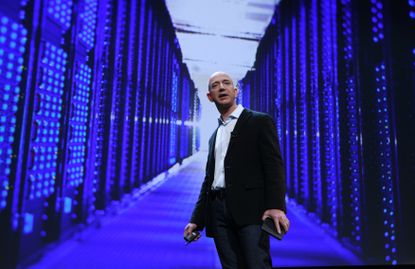What the companies of tomorrow can learn from Amazon today
Why starting with the consumer's needs and working backwards makes such economic sense


Since the beginning of the modern era of capitalism, there have been two schools of thought when it comes to how a for-profit company should operate, and for whom: "shareholder capitalism" and "stakeholder capitalism."
Which of these you subscribe to can change the face of the economic system, since companies will behave differently depending on what managers believe their duties are. The problem is that neither of these systems work very well.
Let's dissect these two views. Shareholder capitalism is the view that a company exists to maximize shareholder value — period. Stakeholder capitalism is the view that companies should balance the interests of their various stakeholders — shareholders, but also managers, workers, customers, the community, and government.
Subscribe to The Week
Escape your echo chamber. Get the facts behind the news, plus analysis from multiple perspectives.

Sign up for The Week's Free Newsletters
From our morning news briefing to a weekly Good News Newsletter, get the best of The Week delivered directly to your inbox.
From our morning news briefing to a weekly Good News Newsletter, get the best of The Week delivered directly to your inbox.
Stakeholder capitalism sounds so commonsensical and innocuous that someone coming from Mars might wonder why anyone would bother with any other theory. Meanwhile, shareholder capitalism sounds heartless and greedy. And yet, today, shareholder capitalism is resilient, and stakeholder capitalism sounds like a breath of fresh air.
But these things move in cycles. The post-war era was the golden age of stakeholder capitalism (after a golden age of shareholder capitalism in the late 19th century, a period that made the Reagan era look like the Soviet Union). In the heyday of the 1950s, large companies like General Motors could spread their profits between workers' unions, managers, shareholders, and customers and still deliver good products at a robust pace of innovation. But the '50s were a unique, non-replicable era in history: Half the world was under the thumb of communism, Europe was in rubble, there were significant trade barriers, plus the economic tailwinds of the Baby Boom, and war effort-driven technological innovations. When you have such economic surplus, spreading the wealth around was easy.
But by the time the 1970s rolled around, managers and unions were feeding at the trough, leaving both customers and shareholders — whose money, mind you, makes the whole thing run — short. By the 1980s, when corporate raiders broke apart lazy conglomerates that had stopped innovating and demanded that managers deliver value for shareholders, they didn't just make themselves rich. They unlocked trapped economic value that unleashed one of the great economic booms of the post-war era.
The problem with stakeholder capitalism is that, while balancing the interests of all the stakeholders sounds nice in theory, in practice, someone has to do the balancing. And more often than not, the "someone" ends up being managers and union bosses who, since they're not being held accountable by the marketplace, mostly end up enriching themselves at the expense of everyone else. Stakeholder capitalism failed, and shareholder capitalism made a strong comeback.
Sign up for Today's Best Articles in your inbox
A free daily email with the biggest news stories of the day – and the best features from TheWeek.com
But in the wake of a major financial crisis that was in many ways driven by financial greed, the idea that shareholder capitalism isn't all it's cracked up to be has merit.
So, neither of these systems really work. What to do? Well, a former hedge fund guy has the answer. He started a new company to prove that a different model could work. You may have heard of that company. It's called Amazon.com.
When Amazon went public, its founder Jeff Bezos wrote a shareholder letter that all fund managers and all CEOs should read. In that letter to his shareholders, he told them he wasn't going to worry about them. Nor was he going to build a namby-fuzzy stakeholder company. Instead, Amazon would focus on one thing, and one thing only: consumers.
At Amazon, any team that works on a new product must start by writing a press release announcing the new product to the world. The point is that whenever someone works on something at Amazon, they should start from how the consumer will benefit and work backwards. This idea, that Amazon works for the consumer first, is woven throughout the company's culture.
But shareholders benefit, too: Amazon's stock has been one of the best performing in history. As Bezos noted in his shareholder letter, shareholders who are long-term focused benefit from a customer-focused company since that company will do well, even if it does forsake some short-term profits in the process. And as shareholders benefit, so do employees, since their compensation is tied to the stock price.
Shareholder capitalism misses some of the key dimensions of what a company does. But stakeholder capitalism is too vague and fuzzy to work in the real world. Consumer capitalism actually aligns with what economic theory says corporations are for: delivering goods and services to customers. That is their social function. Everything else — whether it's jobs or stock price appreciation — is a byproduct.
But this only works in tandem with another key idea in the Amazon playbook: a long-term orientation. This is what ties it all together. A company that really puts the interests of consumers first won't be good for shareholders or employees over the short run, but it will over the long run.
The Amazon model solves the quandaries of the theory of capitalism in an elegant and effective way. By now, it's become commonplace to hail Jeff Bezos as one of the greatest corporate chiefs in history. But it's still underappreciated that he's created a model that can be replicated and help improve all of capitalism in a major way.
Create an account with the same email registered to your subscription to unlock access.
Pascal-Emmanuel Gobry is a writer and fellow at the Ethics and Public Policy Center. His writing has appeared at Forbes, The Atlantic, First Things, Commentary Magazine, The Daily Beast, The Federalist, Quartz, and other places. He lives in Paris with his beloved wife and daughter.
-
 Solo travel: the 'ultimate indulgence in 2024'
Solo travel: the 'ultimate indulgence in 2024'The Week Recommends Why more of us are choosing to go on holiday on our own
By Adrienne Wyper, The Week UK Published
-
 'Stormy Monday for Don'
'Stormy Monday for Don'Today's Newspapers A roundup of the headlines from the US front pages
By The Week Staff Published
-
 6 queer poets to read whenever but especially now
6 queer poets to read whenever but especially nowThe Week Recommends April is National Poetry Month
By Scott Hocker, The Week US Published